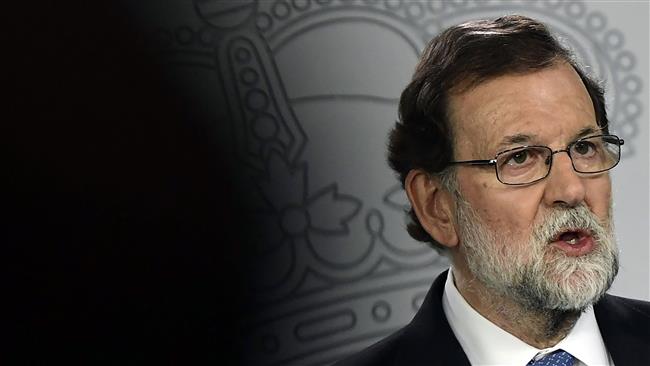Spanish premier dismisses Catalan government, parliament
Spanish Prime Minister Mariano Rajoy has dismissed Catalonia’s president and parliament hours after the region declared independence from Spain.
Speaking in a televised speech on Friday, Rajoy said a new regional election will be held in Catalonia on December 21.
Apart from removing Catalan President Carles Puigdemont, the Spanish premier also dismissed the region’s police chief and ordered central government ministries to take over the Catalan administration.
“Spain is living through a sad day,” Rajoy said, noting, “We believe it is urgent to listen to Catalan citizens, to all of them, so that they can decide their future and nobody can act outside the law on their behalf.”
Catalonia’s 135-seat regional parliament declared independence from Spain on Friday as 70 Catalan lawmakers voted in favor and 10 against. The ballot was boycotted by the opposition Socialist Party, the People’s Party (PP) and Ciudadanos.
Minutes later, Rajoy asked for calm from all Spaniards in a tweet, saying that “the rule of law will restore legality in Catalonia.”
Soon after the vote, the upper house of Spain’s parliament in Madrid made the unprecedented move of authorizing Rajoy’s government to rule Catalonia directly.
In reaction to Madrid’s move, the main secessionist group, the Catalan National Assembly, urged civil servants to respond with “peaceful resistance” and to disobey the Spanish government’s orders.
The regional police, known as the Mossos d’Esquadra, are reportedly divided in their loyalties.
Rajoy’s cabinet later convened to adopt the first measures to govern Catalonia.
“Exceptional measures should only be adopted when no other remedy is possible,” Rajoy said during his speech to the Senate on Friday morning. “In my opinion there is no alternative. The only thing that can be done and should be done is to accept and comply with the law.”

Moreover, Spain’s constitutional court started a review of the vote held in the Catalan parliament, saying the state prosecutor and other parties have three days to make allegations.
Separately, a spokesman for Spain’s public prosecutor’s office said it would file rebellion charges next week against Catalan secessionist leader Puigdemont.
A court will then decide whether to accept the charges against the Catalan president.
On Saturday, the Spanish government had announced its decision to invoke Article 155, which can, upon application, strip Catalonia of its key autonomous powers and allows the central government to impose direct rule over the wealthy region.
Rallies in opposite fronts
Dozens of pro-unity protesters from a large anti-Catalan independence procession in Barcelona attacked the Catalunya Radio headquarters on Friday, breaking the windows of the station and blocking one of its exits.
The clashes made the police intervene and guard the radio’s headquarters against numerous protesters chanting pro-Spain slogans and waving Spanish flags.
The police have also been monitoring the pro-unity demonstration in an attempt to prevent the protesters from reaching Placa Sant Jaume Square, where pro-secession demonstrators are celebrating the unilateral declaration of independence.
Economic uncertainty
Immediately after news of the independence declaration broke, Spanish shares and bonds were sold off, showing the market’s concern over the crisis.
Catalonia already enjoys a high degree of autonomy, but its drive for independence has its roots in the cultural and political suppression that the region experienced during the 1939-1975 Franco dictatorship.
Following the independence declaration in the prosperous region, which contributes about a fifth of Spain’s economy, Spain’s IBEX benchmark fell 2.1 percent and the euro dipped against the dollar.
JP Morgan lowered its forecast for Spain’s GDP for the last quarter of 2017 and first of 2018 to below 3.5 percent due to the uncertainty.
EU opposition to Catalonia drive
The independence declaration called on other countries and institutions to recognize Catalonia. However, the European Union and some countries have made it clear they would not do so and would back the position of Madrid.
In a message posted on Twitter on Friday after the vote, European Council President Donald Tusk said, “For EU nothing changes. Spain remains our only interlocutor.”
He also called on Spain to favor “force of argument, not argument of force.”
France, Germany, Italy and the US also expressed opposition to Catalonia’s independence and voiced support for the Spanish government’s efforts to maintain the country’s sovereignty and rule of law.

British Prime Minister Theresa May also rejected the independence vote, saying, “The UK does not and will not recognize the unilateral declaration of independence made by the Catalan regional parliament. It is based on a vote that was declared illegal by the Spanish courts.”
Meanwhile, a NATO official said Spain was an important ally, adding that Catalonia was “a domestic matter which should be resolved within Spain’s constitutional order.”
European Commission President Jean-Claude Juncker warned of “more cracks” appearing in the European Union, saying, “[The EU] does not need any more cracks, more splits … we should not insert ourselves into what is an internal debate for Spain, but I would not want the European Union to consist of 95 member states in the future.”
Spain has been in turmoil since the Catalan independence referendum that took place on October 1 and was considered by Madrid as illegal. Puigdemont claimed that 90 percent of the voters in the referendum had backed secession, but the turnout had been put at only 43 percent.
Culled from Presstv





